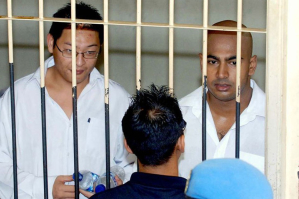
The final legal appeal for two Australians in the "Bali Nine" group, which was supposed to happen on Thursday, has been adjourned until March 19 after a court refused to accept credentials from a lawyer sent by Indonesian president Joko Widodo.
According to Jewel Topsfield of the Sydney Morning Herald, presiding judge Ujang Abdullah said that the final appeal for the Bali Nine ringleaders, Andrew Chan and Myuran Sukumaran, could not be heard until the president's representative in court had a signed letter of power of attorney.
"Because today the defendant is not able to provide a signed authority letter, we can't consider them as a legal representative," Abdullah said.
Topsfield added that the lawyers behind the appeal were led by human rights advocate Todung Mulya Lubis. The lawyers for Chan and Sukumaran argued that the Indonesian president failed to account their cases on an individual basis or look at their rehabilitation after turning down their clemency pleas.
According to George Roberts of ABC News Australia, the two members of the Bali Nine group have attempted to challenge Widodo's decision that denies clemency without exception to all drug smugglers.
"Today's hearing was meant to allow lawyers for the pair to make their cases, and the president's representative the chance to respond," Roberts wrote. "But the lawyer representing the president arrived without signed legal authority."
Roberts reported that the Indonesian government has been sending mixed messages about the fate of the Bali Nine. It is unclear whether they will be executed simultaneously or in smaller groups as all legal options become exhausted.
"The executions may be delayed for months, but [Indonesian attorney general Muhammad Prasetyo] has also left the option open to move more quickly on same cases," Roberts wrote, citing Indonesian media. "There are no plans as yet for any of the executions."
According to Roberts, the adjournments happened after Sukumaran's brother, Chintu, went on Indonesian television to make the case to keep Sukumaran's brother alive, even if it meant spending a lifetime behind bars.
"He committed a crime and he deserves to be punished, and the family is sorry for that," Chintu said of his brother. "We accept that he must be punished, we just don't want him to be executed. We want him to stay in prison and continue to help people."
Topsfield reported that Indonesia's attorney general said that it would "clearly be impossible to cancel the executions."
"There is no delay due to intervention from Australia or other counties offering prisoner swaps," Prasetyo said. "Threats and pressure - it's normal."
Prasetyo added that he hoped "the process can be completed soon."
According to Roberts, Australian Foreign Minister Julie Bishop wrote to her Indonesian counterpart making an offer to pay for the cost of life imprisonment in Indonesia for Chan and Sukumaran if Widodo ends up sparing their lives.
"I have put forward a number of proposals," Bishop said. "I put forward an idea that we should get our officials to discuss ways to resolve what is becoming a very difficult issue for both our nations."
Bishop added that Australia understands "the seriousness of drug trafficking," noting that the request to spare the Australians' lives was being made to Indonesia "in the most respectful way."
"I'm focusing all my efforts on seeking a stay of executions," Bishop said. "Until such time as we are given a time or date, we will continue to assume there is hope."






